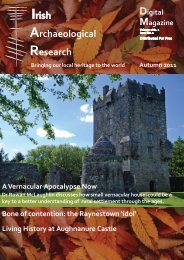Irish Archaeological Research Digital Magazine
Irish Archaeological Research Digital Magazine
Irish Archaeological Research Digital Magazine
You also want an ePaper? Increase the reach of your titles
YUMPU automatically turns print PDFs into web optimized ePapers that Google loves.
Too cool for<br />
When <strong>Irish</strong> Archaeology<br />
<strong>Research</strong> was established, the<br />
most important element of our<br />
ethos was the communication<br />
of archaeology to the general<br />
public, and in particular the<br />
younger generation, so that<br />
they may develop an<br />
appreciation for the rich<br />
heritage that surrounds them.<br />
As archaeology is becoming<br />
more integrated into the<br />
secondary level school<br />
school, not!<br />
Christina O'Regan, Fieldwork and Education Director of IAR,<br />
describes how engaging in archaeological activities helps<br />
children learn about their past.<br />
<strong>Irish</strong> <strong>Archaeological</strong> <strong>Research</strong> Issue 2 Jan 2012<br />
curriculum, organising archaeology workshops, delivered in a school environment, is the ideal way of initiating<br />
hundreds of young people into this exciting subject. There are several, if not dozens, of groups all over the UK<br />
that bring an extra dimension to learning through specifically designed workshops and activities. These<br />
workshops can aid literacy, numeracy and communication skills as well as making education more enjoyable.<br />
Unfortunately, there is a deficit of these groups in the Republic, and indeed in Northern Ireland, though the<br />
Young Archaeology Club (YAC) does provide an outlet for interested youths in Belfast and Downpatrick.<br />
I had been contacted by friends working in education to see if there was a way of bringing archaeology into their<br />
schools. Using the techniques adopted by those UK‐based groups, we devised our own series of activities and<br />
events that can be adapted for each age group.<br />
Students at St. Aidans analyse some Post‐medieval bottles and pottery<br />
Our first foray into school workshops was in November 2011 when we were contacted by the librarian at Plunkett<br />
College, Dublin. This school is one of approximately 30 in the Republic which participates in the Junior Certificate<br />
16



